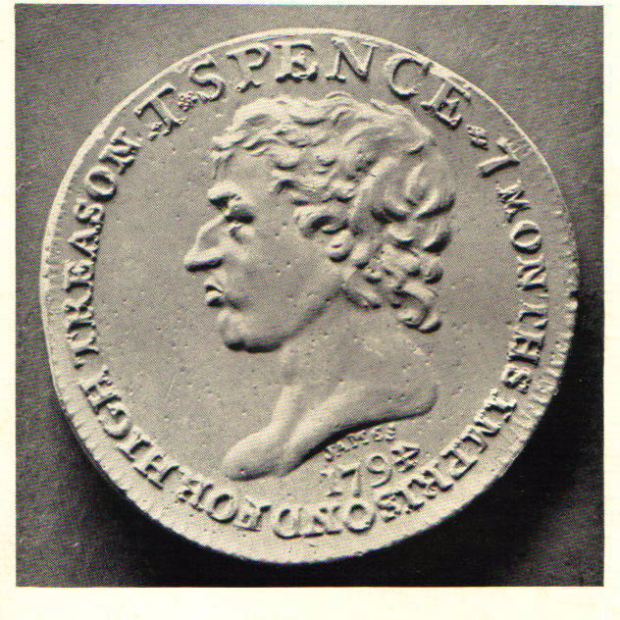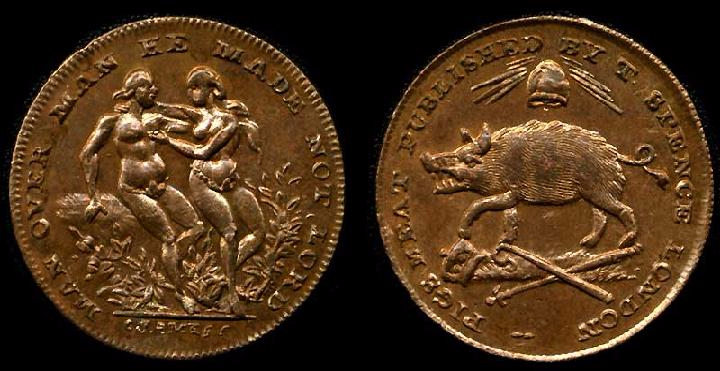
Thomas Spence Words & music by Ed Pickford
1750 was the year - the place Newcastle Quay
Thomas Spence was born to stir the aristocracy
Common ownership of land was Thomas Spence's Plan
Words he wrote in his own hand he called 'Rights of Man'
Thomas went down to South Shields town and then to Marsden Bay
Met with a man of some renown who was living his own way
By the sea and living free, no landlord's servile slave
He had gained his liberty within a limestone cave
Spence was overjoyed to see the essence of a plan
An overthrow of tyranny, equality of man
Passion spurred his fevered hand where storm-tossed seagulls call
Wrote these words to those he damned upon that cave's bare wall
Chorus: {To follow each of following verses}
Ye landlords vile - who rob with guile
And levy where ye can
Your law and lawyers I'll defy
I'll fight for rights of man
Those who seek to innovate and change the status quo
How soon the state will isolate and treat them as the foe
Legals stoats in ermine coats will raise a hue & cry
Such weasel throats condemned poor Spence in Newgate Gaol to lie
Chorus
This brave man's thoughts they still survive, reposing now in print
Waiting there to be brought alive like sparks within a flint
Prison doors with iron claws may cage a body's will
Man-made laws suppress a cause but thoughts they'll never kill
Chorus
More than a brace of centuries have passed since Spence's birth
River still rolls on by the quays controlled by moon & Earth
Thomas Spence and Thomas Paine - two men both of one clan
They raised Cain and sought no gain, they fought for rights of man
T. Spence.
7 MONTHS IN IMPRISONMENT FOR HIGH TREASON. 1794

Thomas Spence
In 1775 he submitted a paper on land tenure to the Philosophical Society, entitled "The Real Rights of Man". This was inspired by a lawsuit between the freemen and the corporation of Newcastle over the use of the common land in the town. He believed that the land had been stolen from the people and should be returned to them. The society expelled him. He hawked his paper about like a halfpenny ballad around the streets of Newcastle. He was a teacher at Haydon Bridge (1776 - 1779) and Sangate Chapel School, Newcastle (1779 - 1787). He pioneered a phonetic script and pronunciation system designed to allow people to learn reading and pronunciation at the same time. He believed that if the correct pronunciation was visible in the spelling, everyone would pronounce English correctly, and the class distinctions carried by language would cease. In the 1780s Spence visited "Jack the Blaster", a farmer and a miner who had been ill-used by his landlords. To escape their tyranny he had created his own dwelling by digging out a cave at Marsden Rocks (which later became the location of the Marsden Grotto Restaurant). Spence, inspired by his story, was possibly the first to use the phrase "RIGHTS OF MAN" when he wrote on the cave's wall : "Ye landlords vile, whose man's peace mar, Come levy rents here if you can; Your stewards and lawyers I defy, And live with all the RIGHTS OF MAN". He set up a bookstall in Chancery Lane in 1792 and was subsequently arrested for seditious libel and imprisoned for a short time. In 1793 he started a penny weekly called "Pig's Meat". In 1794 he was imprisoned for 7 months without trial on a charge of High Treason.
His thoughts were published in "The Meridian Sun of Liberty" in 1796 and subsequently in "the Constitution of Spensonia - A Country in Fairyland". In 1798 he was arrested on suspicion of involvement with the United Irishmen. In 1801 he was arrested and imprisoned for one year for publishing a seditious libel entitled "The Restorer of Society to its natural State". In 1805 he issued "The World turned upside down" as well as a broadside "Something to the Purpose: a Receipt to make a Millennium".
Bewick called him 'one of the warmest philanthropists of the day.'
To be a revolutionary in the early decades of the ninteenth century England was to be a Spencean.
In 1817 Thomas Malthus observed that :
"It is also generally known that an idea has lately prevailed among the lower classes of society that the land is the people's farm, the rent of which ought to be divided equally among them ; and that they have been deprived of the benefits which belong to them, from this their natural inheritance, and by the injustice and oppression of their stewards, the landlords."
Being a Spencean was made illegal and parliament banned "All societies or clubs calling themselves Spencean or Spencean Philanthropists". Spence's name is well-known amongst coin collectors. He used tokens to distribute his ideas and was so fond of them that his friends thought it fit to bury him with a couple of his favourites. He issued coins over stamped with phrases such as "War is starvation" and "Full bellies, fat bairns" and also created new coins or tokens to publicise his thoughts and advertise his penny weekly. Peter Burnham Thomas Spence's Plan:
